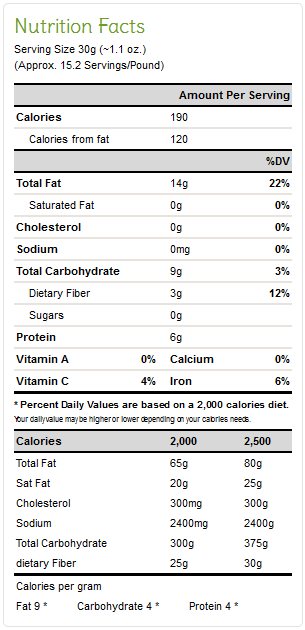Origin: China, USA, Argentina, Brazil, India
Scientific Name: Arachis Hypogaea
Groundnuts originated in Central America and were spread worldwide by European traders. It was use main as animal feed crop until the 1930’s when they became more fashionable for human consumption. China produces over 45% of the world’s groundnuts, followed by India and the USA. 90% of India’s peanut production is processed into peanut oil; In fact the USA, Argentina, Sudan Senegal and Brazil make up 71% of world exports.
Groundnuts are legumes that grow in the ground, although the plant flowers above the ground. From planting to harvesting the growing cycle of a peanut takes four to five months depending on the type and variety. For this reason some countries such as India can produce two crops a year. One the groundnut plant has ben planted, yellow flowers emerge around the lower portion. When these flowers have pollinated themselves the flowers fall off once the peanut ovary begins to form. The embryo turns horizontal to the soil surface and begins to mature into the form of a peanut. Each plant can produce for than forty pods. When the peanuts are ready to harvest the farmer ploughs the ground to collect the peanuts. These inshell nuts are then left to dry for two to three days in the field.
After harvest the peanuts are cleaned using screens and air to remove foreign objects. They can now be sold as inshell peanuts, or shelled and blanched into kernels.
Peanuts can be eaten raw, used in recipes, made into solvents, oil, medicines, and peanut butter as well as having many other uses. The most popular use in the food trade includes roasted and salted peanuts, peanut butter, peanut brittle and also inshell roasted peanuts. Their relative cost compared to other nuts make them an attractive option in nut mixes.
Preliminary studies have shown that the flavonoids in peanuts may increase blood flow to the brain, thus reducing the risk of stroke. Peanuts have an antioxidant content that rivals blackberries and strawberries, which can help protect the heart. Research has suggested that the niacin rich peanut may help prevent Alzheimer’s and age related cognitive decline.


